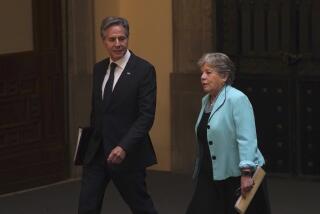U.S. official criticizes Chavez
BOGOTA, COLOMBIA — White House drug czar John P. Walters charged Sunday that the government of President Hugo Chavez was facilitating the rising flow of drugs from his nation to Europe and North America through a lack of enforcement.
The public criticism by Walters, who heads the Office of National Drug Control Policy, was unusually harsh for the Bush administration, which has tried to steer clear of provoking the fiery Venezuelan leader.
With some exceptions, State Department and counter-narcotics officials typically have made anonymous remarks disparaging Venezuela’s weak drug interdiction program.
“Where are the big seizures, where are the big arrests of individuals who are at least logistical coordinators? When it’s being launched from controlled airports and seaports, where are the arrests of corrupt officials? At some point here, this is tantamount to collusion,” Walters said in an interview.
In September, the U.S. government said Venezuela’s was one of two governments that had failed to take sufficient counter-narcotics actions. The Venezuela Information Office, a Washington-based agency funded by the Chavez government, said the accusations were misleading and ignored the country’s “history of cooperating” with international agencies.
Complaints about Venezuelan counter-narcotics operations have risen since August 2005, when Chavez ordered a halt to all cooperation with the U.S. Drug Enforcement Administration office in Caracas, the Venezuelan capital. Since then, seizures have fallen, and drug shipments by aircraft and shipping containers have skyrocketed, U.S. officials have said.
Then-U.S. Ambassador William Brownfield said in 2006 that the amount of drugs flowing through Venezuela had quintupled in five years.
In December, U.S. officials in Caracas said as many as 100 illicit airstrips, stretching from Tachira state in western Venezuela to Bolivar state in the east, were used to transport cocaine. The officials complained that the Chavez government had brought no major convictions of traffickers in several years.
Walters said the volume of Colombian cocaine moving through Venezuela, believed to represent at least one-third of Colombia’s production, continues to increase with no discernible effort by Chavez government to impede it. He provided no statistics to back up his assertion.
Signs of increasing shipments are reflected in rising drug busts in Europe, especially in Spain and Portugal, Walters said.
The European Union last year opened a command center in Lisbon to direct military interdiction efforts, similar to the Pentagon’s Joint Interagency Task Force South command center in Key West.
This month, Portuguese police announced that they had found nearly 10 tons of cocaine in a shipping container that had arrived from Venezuela.
“On the destination side of this flow, there has been action, but on the departure side of the flow, Chavez has not responded, not even in the minimal way,” Walters said.
--
More to Read
Sign up for Essential California
The most important California stories and recommendations in your inbox every morning.
You may occasionally receive promotional content from the Los Angeles Times.










